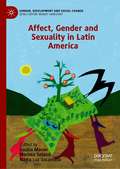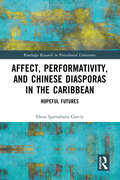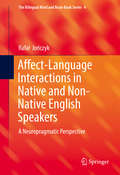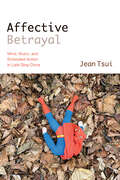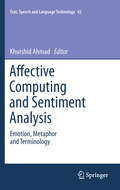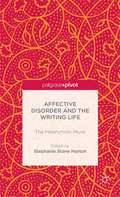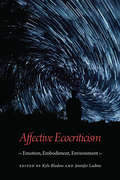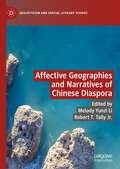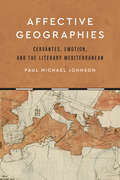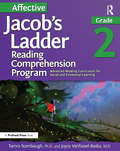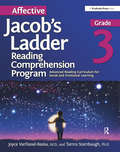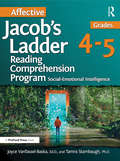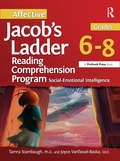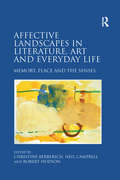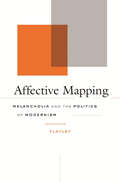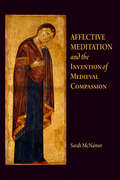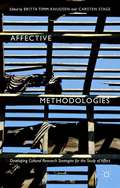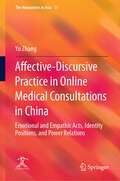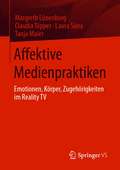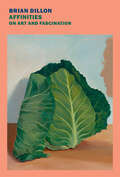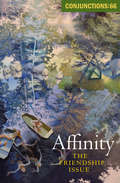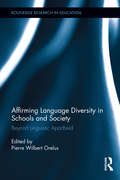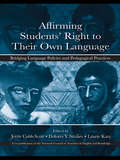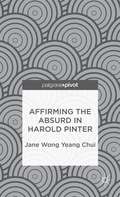- Table View
- List View
Affect, Gender and Sexuality in Latin America (Gender, Development and Social Change)
by Cecilia Macón Mariela Solana Nayla Luz VacarezzaThis book emphasizes the significance of affects, feelings and emotions in how we think about politics, gender and sexuality in Latin America. Considering the complex and even contradictory social processes that the region is experiencing today, many Latin American authors are turning to affect to find a key to understand our present situation, to revisit our history, and to imagine new possibilities for the future. This tendency has shown such a specificity and sometimes departure from northern productions that it compels us to focus more deeply on its own arguments, methods, and critical contributions. This volume features essays that explore the particularities of Latin American ways of thinking about affect and how they can shed new light into our understanding of, gender, sexuality and politics.
Affect, Performativity, and Chinese Diasporas in the Caribbean: Hopeful Futures (Routledge Research in Postcolonial Literatures)
by Elena Igartuburu GarcíaAffect, Performativity, and Chinese Diasporas in the Caribbean: Hopeful Futures analyzes the emergence of Chinese diasporic literature and art in the Caribbean and its diasporas in the twenty-first century. This book considers the historical and critical discourse about the Chinese diasporas in the Caribbean and proposes a textual and visual archive selecting contemporary texts that signal a changing paradigm in postcolonial literature at the turn of the twenty-first century. Whereas, historically, Chinese minorities had been erased or presented as ultimate Others, contemporary texts mobilize Chinese characters and their stories strategically to propose alternative configurations of community and belonging grounded in affective structures and contest the coloniality of national imaginaries.
Affect-Language Interactions in Native and Non-Native English Speakers: A Neuropragmatic Perspective (The Bilingual Mind and Brain Book Series)
by Rafał JończykThis volume provides an up-to-date and evaluative review of theoretical and empirical stances on emotion and its close interaction with language and cognition in monolingual and bilingual individuals. Importantly, it presents a novel methodological approach that takes into account contextual information and hence goes beyond the reductionist approach to affective language that has dominated contemporary research. Owing to this pragmatic approach, the book presents brand new findings in the field of bilingualism and affect and offers the first neurocognitive interpretation of findings reported in clinical and introspective studies in bilingualism. This not only represents an invaluable contribution to the literature, but may also constitute a breakthrough in the investigation of the worldwide phenomenon of bilingualism. Beginning with a thorough review of the history and current state of affective research and its relation to language, spanning philosophical, psychological, neuroscientific, and linguistic perspectives, the volume then proceeds to explore affect manifestation using neuropragmatic methods in monolingual and bilingual individuals. In doing so, it brings together findings from clinical and introspective studies in bilingualism with cognitive, psychophysiological and neuroimaging paradigms. By combining conceptual understanding and methodological expertise from many disciplines, this volume provides a comprehensive picture of the dynamic interactions between contextual and affective information in the language domain. Thus, Affect-Language Interactions in Native and Non-Native English Speakers: A Neuropragmatic Perspective fosters a pragmatic approach to research on affective language processing in monolingual and bilingual population, one that builds bridges across disciplines and sparks important new questions in the cognitive neuroscience of bi- and multilingualism.
Affecting Grace
by Kenneth C. CalhoonAffecting Grace examines the importance of Shakespeare's poetry and plays within German literature and thought after 1750 - including its relationship to German classicism, which favoured unreflected ease over theatricality. Kenneth S. Calhoon examines this tension against an extensive backdrop that includes a number of canonical German authors - Goethe, Schiller, Herder, Lessing, von Kleist, and Nietzsche - as well as the advent of Meissen porcelain, the painting of Bernardo Bellotto and Francesco Guardi, and aspects of German styles of architecture.Extending from Shakespeare's The Merchant of Venice (c. 1597) to Kleist's The Broken Jug (1806), this study turns on the paradox that the German literary world had begun to embrace Shakespeare just as it was firming up the broad but pronounced anti-Baroque sensibility found pivotally in Lessing's critical and dramatic works. Through these investigations, Calhoon illuminates the deep cultural changes that fundamentally affected Germany's literary and artistic traditions.
Affective Betrayal: Mind, Music, and Embodied Action in Late Qing China (SUNY series in Chinese Philosophy and Culture)
by Jean TsuiAffective Betrayal uses "affect" as an analytical category to explicate the fragility and fragmentation of Chinese political modernity. In so doing, the book uncovers some of the unresolved moral and philosophical obstacles China encountered in the past, as well as the cultural predicament the country faces at present.At the turn of the twentieth century, China's leading reformer Liang Qichao (1873–1929) presented modern political knowledge in musical and visual representational formats that were designed to stimulate readers' bodily senses. By expanding the reception of textual knowledge from "reading" to "listening" and "visualizing experiences," Liang generated an epistemic shift, and perhaps an all-inclusive internal intellectual, philosophical, and moral transition, alongside China's modern political reform. By tracing the marginalized academic and philosophical positions Liang sought to restore in China's incipient democratic movement, Affective Betrayal examines how his attempts to conjoin Confucian morality and liberal democracy expose hidden anxieties as well as inherent contradictions between these two systems of thought. These conflicts, besides disrupting the stability of China's burgeoning modern political order, explain why the import of modern concepts led to China's continued political impasse, rather than rationality and progress, after the 1911 revolution.
Affective Computing and Sentiment Analysis: Emotion, Metaphor and Terminology (Text, Speech and Language Technology #45)
by Khurshid AhmadThis volume maps the watershed areas between two 'holy grails' of computer science: the identification and interpretation of affect - including sentiment and mood. The expression of sentiment and mood involves the use of metaphors, especially in emotive situations. Affect computing is rooted in hermeneutics, philosophy, political science and sociology, and is now a key area of research in computer science. The 24/7 news sites and blogs facilitate the expression and shaping of opinion locally and globally. Sentiment analysis, based on text and data mining, is being used in the looking at news and blogs for purposes as diverse as: brand management, film reviews, financial market analysis and prediction, homeland security. There are systems that learn how sentiments are articulated. This work draws on, and informs, research in fields as varied as artificial intelligence, especially reasoning and machine learning, corpus-based information extraction, linguistics, and psychology.
Affective Disorder and the Writing Life: The Melancholic Muse
by Stephanie Stone HortonAffective Disorder and the Writing Life interrogates the mythos of the 'mad writer' through lived experience, literary analysis, writerly reflection and contemporary neuroscience. It explores how affective disorders colour, drive and sometimes silence the writing mind - and how affective difference has always informed the literary imagination.
Affective Ecocriticism: Emotion, Embodiment, Environment
by Kyle Bladow Jennifer LadinoScholars of ecocriticism have long tried to articulate emotional relationships to environments. Only recently, however, have they begun to draw on the complex interdisciplinary body of research known as affect theory. Affective Ecocriticism takes as its premise that ecocritical scholarship has much to gain from the rich work on affect and emotion happening within social and cultural theory, geography, psychology, philosophy, queer theory, feminist theory, narratology, and neuroscience, among others. This vibrant and important volume imagines a more affective—and consequently more effective—ecocriticism, as well as a more environmentally attuned affect studies. These interdisciplinary essays model a range of approaches to emotion and affect in considering a variety of primary texts, including short story collections, films, poetry, curricular programs, and contentious geopolitical locales such as Canada’s Tar Sands. Several chapters deal skeptically with familiar environmentalist affects like love, hope, resilience, and optimism; others consider what are often understood as negative emotions, such as anxiety, disappointment, and homesickness—all with an eye toward reinvigorating or reconsidering their utility for the environmental humanities and environmentalism. Affective Ecocriticism offers an accessible approach to this theoretical intersection that will speak to readers across multiple disciplinary and geographic locations.
Affective Geographies and Narratives of Chinese Diaspora (Geocriticism and Spatial Literary Studies)
by Robert T. Tally Jr. Melody Yunzi LiIn various ways, Chinese diasporic communities seek to connect and re-connect with their “homelands” in literature, film, and visual culture. The essays in Affective Geographies and Narratives of Chinese Diaspora examine how diasporic bodies and emotions interact with space and place, as well as how theories of affect change our thinking of diaspora. Questions of borders and border-crossing, not to mention the public and private spheres, in diaspora literature and film raise further questions about mapping and spatial representation and the affective and geographical significance of the push-and-pull movement in diasporic communities. The unique experience is represented differently by different authors across texts and media. In an age of globalization, in “the Chinese Century,” the spatial representation and cultural experiences of mobility, displacement, settlement, and hybridity become all the more urgent. The essays in this volume respond to this urgency, and they help to frame the study of Chinese diaspora and culture today.
Affective Geographies: Cervantes, Emotion, and the Literary Mediterranean (Toronto Iberic)
by Paul Michael JohnsonFor Miguel de Cervantes, to narrate a Mediterranean experience is to necessarily speak of an emotional experience. Affective Geographies takes as its point of departure the premise that literature is as influential in constructing the Mediterranean as are its geographic, climatic, or economic features. As the writer with the most vast and varied Mediterranean experience of his era, Cervantes is exceptionally well-suited for the critical task of recovering the literary Mediterranean. Engaging with the interdisciplinary fields of Mediterranean studies, affect theory, and the history of emotion, Paul Michael Johnson reads Cervantes’s texts alongside the affective structures that inscribe the Mediterranean as a space of conflict, commerce, expansion, and empire. In particular, he argues that Cervantes’s writing, with its uncommon focus on the Moorish, Islamic, and North African experience, can serve to realign misconceptions about the Mediterranean we have inherited today. Affective Geographies proposes that, with a more than four-hundred-year history of impacting the hearts and minds of readers, Cervantes’s works constitute a literary longue durée, ramifying beyond fiction to alter the popular imaginary and long-term cultural landscape.
Affective Jacob's Ladder Reading Comprehension Program: Grade 2
by Tamra Stambaugh Joyce VanTassel-BaskaThe Affective Jacob's Ladder Reading Comprehension Program uses a models approach to scaffold student learning and promote inquiry-based discussions of texts. This series of Jacob's Ladder: Focuses specifically on supporting advanced students' social-emotional needs. Includes high-interest reading selections in the following genres: short stories and media, poetry, and biographies. Moves students from lower to higher level skills of self-awareness, metacognition, and goal setting. Integrates reading comprehension and analysis skills with affective and social-emotional needs. Asks students to apply themes, character or real-life experiences, and lessons from texts to their own lives. New ladders were specially designed for this series and derived from relevant theories about empathy, risk and resilience, achievement motivation, and mindsets and practices for cultivating talent. The Affective Jacob's Ladder guides provide teachers with an explanation of the nature and substance of the theoretical constructs for each ladder. Also included are an overview of the goals and objectives of each ladder and suggestions for how to implement the ladders in the classroom in a way that supports students' academic and social-emotional needs at the same time. Optional Student Workbooks In addition to this teacher's guide, companion student workbooks are available for Picture Books, Short Stories and Media, and Poetry and Biographies. The student workbooks feature ample room for student responses and notes, make reviewing and providing feedback on student work easier than ever, provide students with an easy-to-use reference to use during discussions, and save time, as there is no need to reproduce student handouts.
Affective Jacob's Ladder Reading Comprehension Program: Grade 3
by Tamra Stambaugh Joyce VanTassel-BaskaThe Affective Jacob's Ladder Reading Comprehension Program uses a models approach to scaffold student learning and promote inquiry-based discussions of texts. This series of Jacob's Ladder: Focuses specifically on supporting advanced students' social-emotional needs. Includes high-interest reading selections in the following genres: short stories and media, poetry, and biographies. Moves students from lower to higher level skills of self-awareness, metacognition, and goal setting. Integrates reading comprehension and analysis skills with affective and social-emotional needs. Asks students to apply themes, character or real-life experiences, and lessons from texts to their own lives. New ladders were specially designed for this series and derived from relevant theories about empathy, risk and resilience, achievement motivation, and mindsets and practices for cultivating talent. The Affective Jacob's Ladder guides provide teachers with an explanation of the nature and substance of the theoretical constructs for each ladder. Also included are an overview of the goals and objectives of each ladder and suggestions for how to implement the ladders in the classroom in a way that supports students' academic and social-emotional needs at the same time. Optional Student Workbook Packs In addition to this teacher's guide, companion student workbooks are available for Picture Books, Short Stories and Media, and Poetry and Biographies. The student workbooks feature ample room for student responses and notes, make reviewing and providing feedback on student work easier than ever, provide students with an easy-to-use reference to use during discussions, and save time, as there is no need to reproduce student handouts.
Affective Jacob's Ladder Reading Comprehension Program: Grades 4-5
by Tamra Stambaugh Joyce VanTassel-BaskaThe Affective Jacob's Ladder Reading Comprehension Program uses a models approach to scaffold student learning and promote inquiry-based discussions of texts. This series of Jacob's Ladder: Focuses specifically on supporting advanced students' social-emotional needs.Includes high-interest reading selections in the following genres: short stories and media, poetry, and biographies.Moves students from lower to higher level skills of self-awareness, metacognition, and goal setting.Integrates reading comprehension and analysis skills with affective and social-emotional needs.Asks students to apply themes, character or real-life experiences, and lessons from texts to their own lives. New ladders were specially designed for this series and derived from relevant theories about empathy, risk and resilience, achievement motivation, and mindsets and practices for cultivating talent. The Affective Jacob's Ladder guides provide teachers with an explanation of the nature and substance of the theoretical constructs for each ladder. Also included are an overview of the goals and objectives of each ladder and suggestions for how to implement the ladders in the classroom in a way that supports students' academic and social-emotional needs at the same time. Optional Student Workbook Packs In addition to this teacher's guide, companion student workbooks are available for Short Stories and Media, Poetry, and Biographies, Essays and Speeches. The student workbooks feature ample room for student responses and notes, make reviewing and providing feedback on student work easier than ever, provide students with an easy-to-use reference to use during discussions, and save time, as there is no need to reproduce student handouts.
Affective Jacob's Ladder Reading Comprehension Program: Grades 6-8
by Tamra Stambaugh Joyce VanTassel-BaskaThe Affective Jacob's Ladder Reading Comprehension Program uses a models approach to scaffold student learning and promote inquiry-based discussions of texts. This series of Jacob's Ladder: Focuses specifically on supporting advanced students' social-emotional needs.Includes high-interest reading selections in the following genres: short stories and media, poetry, and biographies.Moves students from lower to higher level skills of self-awareness, metacognition, and goal setting.Integrates reading comprehension and analysis skills with affective and social-emotional needs.Asks students to apply themes, character or real-life experiences, and lessons from texts to their own lives. New ladders were specially designed for this series and derived from relevant theories about empathy, risk and resilience, achievement motivation, and mindsets and practices for cultivating talent. The Affective Jacob's Ladder guides provide teachers with an explanation of the nature and substance of the theoretical constructs for each ladder. Also included are an overview of the goals and objectives of each ladder and suggestions for how to implement the ladders in the classroom in a way that supports students' academic and social-emotional needs at the same time. Optional Student Workbook Packs In addition to this teacher's guide, companion student workbooks are available for Short Stories and Media, Poetry and Song Lyrics, and Biographies, Essays, and Speeches. The student workbooks feature ample room for student responses and notes, make reviewing and providing feedback on student work easier than ever, provide students with an easy-to-use reference to use during discussions, and save time, as there is no need to reproduce student handouts.
Affective Landscapes in Literature, Art and Everyday Life: Memory, Place and the Senses
by Neil Campbell Christine BerberichBringing together a diverse group of scholars representing the fields of cultural and literary studies, cultural politics and history, creative writing and photography, this collection examines the different ways in which human beings respond to, debate and interact with landscape. How do we feel, sense, know, cherish, memorise, imagine, dream, desire or even fear landscape? What are the specific qualities of experience that we can locate in the spaces in and through which we live? While the essays most often begin with the broadly literary - the memoir, the travelogue, the novel, poetry - the contributors approach the topic in diverse and innovative ways. The collection is divided into five sections: ’Peripheral Cultures’, dealing with dislocation and imagined landscapes'; ’Memory and Mobility’, concerning the road as the scene of trauma and movement; ’Suburbs and Estates’, contrasting American and English spaces; ’Literature and Place’, foregrounding the fluidity of the fictional and the real and the human and nonhuman; and finally, ’Sensescapes’, tracing the sensory response to landscape. Taken together, the essays interrogate important issues about how we live now and might live in the future.
Affective Mapping: Melancholia and the Politics of Modernism
by Jonathan FlatleyThe surprising claim of this book is that dwelling on loss is not necessarily depressing. Instead, Jonathan Flatley argues, embracing melancholy can be a road back to contact with others and can lead people to productively remap their relationship to the world around them. Flatley demonstrates that a seemingly disparate set of modernist writers and thinkers showed how aesthetic activity can give us the means to comprehend and change our relation to loss. The texts at the center of Flatley’s analysis—Henry James’s Turn of the Screw, W. E. B. Du Bois’s The Souls of Black Folk, and Andrei Platonov’s Chevengur—share with Freud an interest in understanding the depressing effects of difficult losses and with Walter Benjamin the hope that loss itself could become a means of connection and the basis for social transformation. For Du Bois, Platonov, and James, the focus on melancholy illuminates both the historical origins of subjective emotional life and a heretofore unarticulated community of melancholics. The affective maps they produce make possible the conversion of a depressive melancholia into a way to be interested in the world.
Affective Meditation and the Invention of Medieval Compassion (The Middle Ages Series)
by Sarah McNamerAffective meditation on the Passion was one of the most popular literary genres of the high and later Middle Ages. Proliferating in a rich variety of forms, these lyrical, impassioned, script-like texts in Latin and the vernacular had a deceptively simple goal: to teach their readers how to feel. They were thus instrumental in shaping and sustaining the wide-scale shift in medieval Christian sensibility from fear of God to compassion for the suffering Christ.Affective Meditation and the Invention of Medieval Compassion advances a new narrative for this broad cultural change and the meditative writings that both generated and reflected it. Sarah McNamer locates women as agents in the creation of the earliest and most influential texts in the genre, from John of Fécamp's Libellus to the Meditationes Vitae Christi, thus challenging current paradigms that cast the compassionate affective mode as Anselmian or Franciscan in origin. The early development of the genre in women's practices had a powerful and lasting legacy. With special attention to Middle English texts, including Nicholas Love's Mirror and a wide range of Passion lyrics and laments, Affective Meditation and the Invention of Medieval Compassion illuminates how these scripts for the performance of prayer served to construct compassion itself as an intimate and feminine emotion. To feel compassion for Christ, in the private drama of the heart that these texts stage, was to feel like a woman. This was an assumption about emotion that proved historically consequential, McNamer demonstrates, as she traces some of its legal, ethical, and social functions in late medieval England.
Affective Methodologies: Developing Cultural Research Strategies For The Study Of Affect
by Britta Timm Knudsen Carsten StageThe collection proposes inventive research strategies for the study of the affective and fluctuating dimensions of cultural life. It presents studies of nightclubs, YouTube memes, political provocations, heritage sites, blogging, education development, and haunting memories.
Affective-Discursive Practice in Online Medical Consultations in China: Emotional and Empathic Acts, Identity Positions, and Power Relations (The Humanities in Asia #11)
by Yu ZhangThis book provides readers with the latest research on the affective aspect of online interactions between doctors and e-patients in the context of China from a poststructuralist discourse analysis perspective. At the heart of this book is the presentation of four chapters which address (1) indirect negative emotional acts by e-patients and empathic acts by doctors (constituting “affective practice”), (2) the interactional discursive features involved in the affective practice, (3) discursive positions of e-patients and doctors within the affective practice context, and (4) power relations that are reflected in the positionings. This book sheds light on the importance of examining the affective facet of medical consultation, when it comes to identifying non-traditional positions and power relations in doctor-patient communication. It also provides the implication that e-healthcare platforms, especially those with an e-commercialized model for healthcare services, have potential to produce a type of neo-liberal discourse—the e-commercialized medical consultation discourse—in which patients and caregivers, who are acknowledged as the less powerful group in the traditional healthcare activities, are empowered and privileged.
Affektive Medienpraktiken: Emotionen, Körper, Zugehörigkeiten im Reality TV
by Margreth Lünenborg Claudia Töpper Laura Sūna Tanja MaierDas Buch liefert eine affekttheoretisch informierte Analyse des Reality TV. Dabei wird das komplexe Affektgeschehen zwischen Fernsehsendung, Medientechnologie und den Körpern der Zuschauenden empirisch zugänglich und sichtbar. Eine multiperspektivische Analyse zeigt auf, welche Strategien und Muster der Erzeugung von Affekten und Emotionen Fernsehproduzent*innen nutzen, wie Inklusion und Exklusion im audiovisuellen Medientext für Zuschauende körperlich spürbar wird und welche Spuren Affekte in den Körpern und den Diskursen des Publikums hinterlassen. Auf den Ebenen Körper, Diskurse und Praktiken werden auf diese Weise affektive Dynamiken der Aushandlung von Zugehörigkeiten analysiert. Die Studie leistet damit einen methodisch wie auch theoretisch innovativen Beitrag zur Affekt- und Emotionsforschung in der Kommunikationswissenschaft.
Affinities: On Art and Fascination
by Brian DillonA meditation on the power and pleasures of the image, from paintings to photographs to migraine auras, by one of Britain's finest literary minds.In Affinities, Brian Dillon, who Joyce Carol Oates has said writes &“fascinating prose . . . on virtually any subject,&” explores images and artists he is drawn to and analyzes the attraction. What does it mean to claim affinity with a picture? What do feelings of affinity imply about the experience of art and of the world? Affinities is a critical and personal study of a sensation that is not exactly taste, desire, or solidarity, but has aspects of all three. Approaching this subject via discrete examples, Dillon examines works by artists such as Dora Maar and Andy Warhol, Rinko Kawauchi and Susan Hiller, as well as scientific or vernacular images of sea creatures and migraine auras. Written as a series of linked essays, Affinities completes a trilogy, with Essayism and Suppose a Sentence, about the intimate and abstract pleasures of reading and looking.
Affinity: The Friendship Issue (Conjunctions #66)
by Jonathan Carroll Joyce Carol Oates Rick Moody Robert Coover Jedediah Berry John Ashbery Robert Clark Elizabeth Gaffney Stephen O'Connor Robert Duncan Sallie Tisdale Matthew Cheney Elizabeth Robinson Tim Horvath Paul Lisicky Darcey Steinke Andrew Ervin Roberta Allen Brandon Hobson Charles B. Stozier Diane Josefowicz Emily Houk Gilles Tiberghien Isabella Hammad M. J. Rey Michelle Herman Spencer Matheson Rachel Blau DuPlessis J. W. McCormackNew writings on the topic of friendship from Stephen O&’Connor, Joyce Carol Oates, Robert Clark, Elizabeth Gaffney, Rick Moody and Darcey Steinke, and more. Aristotle proposed that a friend is, in essence, &“another self,&” and it is indisputable that our relationships with our friends are nearly as complex as the ones we have with ourselves: One minute we&’re in perfect accord, another we&’re uncertain. Friendships are as mercurial as they are essential. We form friendships that are fraught, friendships that fade, and friendships that are as important to us as our very lives.Conjunctions: 66, Affinity investigates the phenomenon of friendship in its many forms through innovative and provocative fiction, poetry, and essays by writers of every ilk.This collection includes contributions by Rick Moody and Darcey Steinke, Robert Coover, Rachel Blau DuPlessis, Elizabeth Gaffney, Andrew Ervin, Stephen O&’Connor, Gilles Tiberghien, Michelle Herman, Robert Clark, Jonathan Carroll, Sallie Tisdale, Robert Duncan, Jedediah Berry and Emily Houk, Diane Josefowicz, Brandon Hobson, Charles B. Strozier, Spencer Matheson, Paul Lisicky, John Ashbery, J. W. McCormack, Isabella Hammad, Tim Horvath, Roberta Allen, M. J. Rey, Elizabeth Robinson, Matthew Cheney, and Joyce Carol Oates.
Affirming Language Diversity in Schools and Society: Beyond Linguistic Apartheid (Routledge Research in Education)
by Pierre Wilbert OrelusLanguage is perhaps the most common issue that surfaces in debates over school reform, and plays a vital role in virtually everything we are involved. This edited volume explores linguistic apartheid, or the disappearance of certain languages through cultural genocide by dominant European colonizers and American neoconservative groups. These groups have historically imposed hegemonic languages, such as English and French, on colonized people at the expense of the native languages of the latter. The book traces this form of apartheid from the colonial era to the English-only movement in the United States, and proposes alternative ways to counter linguistic apartheid that minority groups and students have faced in schools and society at large. Contributors to this volume provide a historical overview of the way many languages labeled as inferior, minority, or simply savage have been attacked and pushed to the margins, discriminating against and attempting to silence the voice of those who spoke and continue to speak these languages. Further, they demonstrate the way and the extent to which such actions have affected the cultural life, learning process, identity, and the subjective and material conditions of linguistically and historically marginalized groups, including students.
Affirming Students' Right to their Own Language: Bridging Language Policies and Pedagogical Practices
by Jerrie Cobb Scott Dolores Y. Straker Laurie KatzA Co-publication of the National Council of Teachers of English and Routledge. How can teachers make sound pedagogical decisions and advocate for educational policies that best serve the needs of students in today’s diverse classrooms? What is the pedagogical value of providing culturally and linguistically diverse students greater access to their own language and cultural orientations? This landmark volume responds to the call to attend to the unfinished pedagogical business of the NCTE Conference on College Composition and Communication 1974 Students’ Right to Their Own Language resolution. Chronicling the interplay between legislated/litigated education policies and language and literacy teaching in diverse classrooms, it presents exemplary research-based practices that maximize students' learning by utilizing their home-based cultural, language, and literacy practices to help them meet school expectations. Pre-service teachers, practicing teachers, and teacher educators need both resources and knowledge, including global perspectives, about language variation in PreK-12 classrooms and hands-on strategies that enable teachers to promote students’ use of their own language in the classroom while also addressing mandated content and performance standards. This book meets that need. Visit http://www.ncte.org for more information about NCTE books, membership, and other services.
Affirming the Absurd in Harold Pinter
by Jane Wong Yeang ChuiUsing Martin Esslin's invention - the Theatre of the Absurd - to examine Pinter's works, Wong brings the complexities and intricacies of the plays to the forefront, provoking readers and audiences to reconsider and problematize more conventional studies of his plays.
